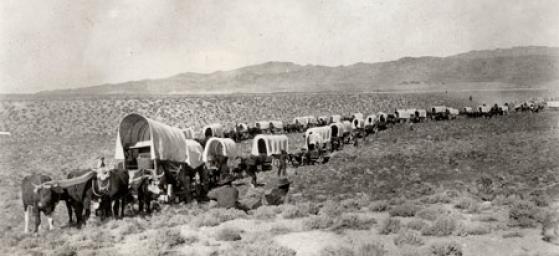Traveling West
Long ago, when people settled the United States, most people lived in the East. It was hard to travel west. There were no planes, trains, or automobiles. People traveled by wagon or boat.
In the 1840s, many people traveled far across the United States. They were traveling to the West. They were pioneers. They would settle in the western part of the country.
Getting to the west was very difficult. There were no roads. People traveled in groups. Each family would buy a covered wagon. That is a big wagon with a kind of tent on it.
Each family would pack the tools and supplies they needed to build a new home. They would have to fit all they took in their wagon. Then they would travel together. They made what was called a wagon train. It was a group of wagons all going the same way. They would meet with other families to plan their trip. They would choose a route.
When the families started the trip, they did not know each other. They met when the trip began. But they would spend more than a year together. So they got to know each other well. Sometimes they would borrow tools from each other. Sometimes they shared food. They had to travel in bad weather. It was a long trip.
It would take more than a year to reach the West. The families sometimes had babies along the way. The wagon train would stop for a few days to help the mother with the baby. Then they would keep going. They knew they had a long way to travel. They could not stay long.
When the wagon train got to the West, the families would settle there. They would build homes. They would start farms. They would build communities. Those communities would grow into towns and cities.
It was hard to get to the West in the pioneer days. Then people built roads. People built a railroad that crossed the United States. By 1900, there were many more people in the West. People came west by train. A trip that had taken months now took a few days. The railroad brought many changes.
